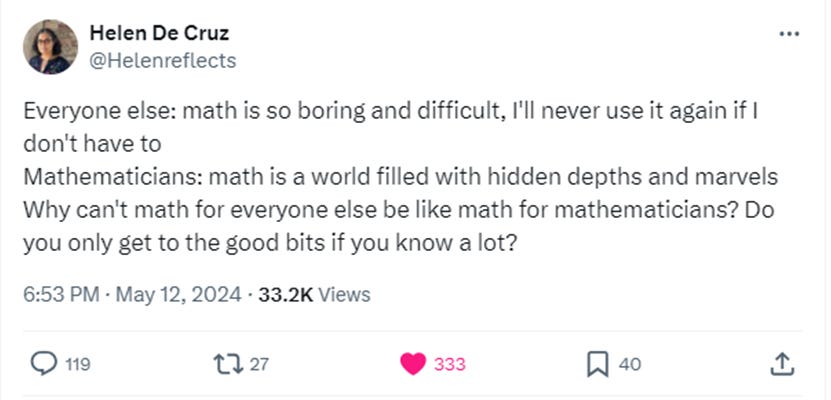Over on ex-Twitter, Helen De Cruz had an interesting comment on perceptions of math between groups:
My take on this, as I said in a quote-tweet, is basically that this isn’t unique to math:
This is true of a huge number of professions and areas of study-- I find finance tedious, but my rich friends are endlessly fascinated by it, non-lawyers find law dull, etc. We just fret about it more with STEM fields, for some reason
It’s probably worth poking at the “for some reason” part of this a little more, though. It will probably not come as a surprise to learn that this ties into one of my recurring pet peeves, namely the way that we bracket off science and math as activities.
This isn’t a really clean two-kinds-of-reactions sort of division, though, because there are at least two divisions happening here. One of them is crassly economic: extremely well-compensated areas like the specific examples I used, law and finance, tend to greet disinterest with a shrug. If I say I find finance tedious, my investment-banker friends don’t try to sell me on its inherent beauty, but take more of a “that’s your loss, then” sort of view. If I find making shitloads of money boring, they don’t particularly care, because they’ve got shitloads of money. Law and medicine are similar in that flippin’ great wodges of cash go a long way to reduce the sting of other people finding your career uninteresting.
The less-well compensated side of the economic divide is where you get the defensive reactions to disinterest— in particular, any career that’s primarily academic or service-oriented is a career that people pursue for non-financial rewards. People who have made that choice are always ready to justify it by reference to the intrinsic rewards of whatever it is that they do: the altruistic rush of making the world a better place, or the inherent fascination of studying some subject.
The thing that I find striking is how much of the response from STEM people to questions like De Cruz’s— “Why don’t more people find math and science as fascinating as mathematicians and scientists do?”— is in the form of an apology. One of the very standard lines in reply to someone complaining that they found math or science dry and boring is “Yeah, sorry, they’re often taught really badly, we’re trying to do better…” I know it’s my go-to when this sort of thing comes up after a book talk or the like.
On the other side of the infamous Two Cultures divide, though, the most common response is what I think of as the “Heinlein Dance” from spending much of the 90’s in the rec.arts.sf.* hierarchy of Usenet (ask your parents). Robert Heinlein was an extremely prolific author from the classic period of science fiction, with a very dedicated fan base. “You need to read Heinlein!” was a standard recommendation to anyone new to the genre, but by the time I was reading Usenet his best works were at least a decade old (he says, hand-waving past a gigantic flamewar over when Heinlein’s books stopped being good (if they did)…), so they wouldn’t necessarily land with new readers.
The response whenever anybody would say this was “Oh, you just haven’t read the right Heinlein…” And since the man published thirty-odd novels in his career, covering a wide range of subgenres, there was always another book to suggest as the one that was sure to convert the skeptic. The Heinlein Dance would go on basically as long as the newbie could stand it, always with a next book to try; I don’t think I ever saw anyone on the pro-Heinlein side concede that “Yeah, he’s just not for you…”
Whenever I see somebody express disinterest in some artistic category— books, music, dance, painting, sculpture— the response from fans of that category is a version of the Heinlein Dance: “Oh, you just didn’t see the right work of that type, you need to try this, instead…” This happens at about the same rate as STEM people apologizing for bad teaching, and works about as well as endlessly recommending actual Heinlein books did circa 1998. This general class of reaction comes even from STEM people. I made reference to SteelyKid’s distaste for high-school English at a happy hour event full of science and engineering faculty, and was immediately met with a bunch of “They just need to try this other book…” recommendations. I’ve said off-handedly dismissive things about classical music at physics conferences and ended up getting bunch of people trying to pitch me on something else that would be the right symphony, or whatever. And so on.
To be sure, there are people on both sides of the Two Cultures rift who will respond to disinterest in their preferred subject as if it’s revealing a character defect; “Yeah, some people are too dumb to do math” vs. “If you don’t appreciate [art form] you’re a soulless corporate drone.” This is not about them, because they’re mostly assholes. The interesting thing to me is the distribution of the other two reactions— I almost never see STEM people do the Heinlein Dance, and I rarely see not-STEM people apologize for their subject being badly taught (which is distinct from teaching the “wrong” books).
Back when I started writing Eureka (more than a decade ago, yikes), I was a lot more militantly pro-STEM, and pushed for more rigorous expectations and less tolerance for excuses. The asymmetry inherent in offering “Physics for Poets” when nobody would consider “Poetry for Physicists” really irked me. I softened a lot on that, ending up with the framing that’s in the book, that most of the split is basically a matter of taste: some people find the things you need to do to succeed in science and math more congenial, and that leads them to enjoy those subjects more and become better at them than people who don’t find those particular tasks as enjoyable.
At the end of the day, on both sides of the split, the “correct” response to somebody who’s not fired up about whatever subject is some form of “Yeah, that’s probably not for you, and that’s just fine.” Nobody needs to like math, any more than anybody needs to like opera— it’s a great big world, and different people enjoy different things. The only thing we “need” to cultivate is some minimal level of respect for the tastes and preferences of others.
Which in the end makes me more comfortable with the continued existence of “Physics for Poets” classes: the idea isn’t to force-feed arts majors any particular bit of scientific knowledge, but to convey a general sense of the field as something other people might reasonably find worth caring deeply about. It also, though, gives me a good deal more sympathy for the notion that there ought to be a parallel “Poetry for Physicists” sort of track, something more tailored to the tastes and preferences of the kinds of students who know they’re going to take one and only one literature class, in the way that “Physics for Poets” is targeted to the kinds of students who will take one and only one science class.
That’s a long-running quixotic ambition of mine, though, not a thing that will happen any time soon. In the mean time, I’d settle for a bit less apologizing and Heinlein Dancing, and a bit more “Yeah, it’s okay if that’s not your thing…” from everyone.
This is actually softened quite a bit from a more irritated first draft, which is both fitting and probably guarantees less engagement. If you’d like to try to provoke a return to the angrier version, the comments will be open:
And if you want to see whether anyone succeeds, click this button:






I think you get this in a lot of fields where you don't get much payoff early on. Many fields are attractive, but as soon as you get into the hard stuff, the stuff that you have to do fairly well to get a return, only some people find the attraction of the field itself or at least the rewards from the field to outweigh the need to do the hard work of getting better at it.
Typically in the arts, there are rewards for having a basic facility. You can write a funny blog post, play a recognizable tune on a guitar, or draw pretty enough flowers. You get that return in many sports. You don't have to play at a professional or even collegiate level to enjoy a game of tennis or basketball or running or biking to find it rewarding. There are countless others at roughly your level of competence if you feel a need to compete. It still takes time and effort to get really good in these areas, but there are payoffs along the way. (Think of it as natural gamification.)
Choose something like cabinet making, aviation or weaving, and you have to get much deeper into the weeds to start getting the goodies. Pick another field like finance, mathematics, law or chemistry, and the payoffs may be even farther out. Some people start finding rewards sooner than others. The path may line up with their existing interests or talents. In some situations, the path may provide lucrative or social benefits even early on.
I personally would want to take "literature for physicists", "visual arts for mathematicians", "music for science majors" and similar. In fact I did eventually take "music for science majors", or at least an equivalent - it was in the overall genre of "music appreciation", not specifically directed at STEM people, and not from a 4 yr university.
My grounding in arts of all kinds was terrible. I read voraciously, and picked up some so-called literature that way - but no theory or comprehensive overview. My parents played classical and some folk music on their old record player, and there was also AM radio, and music associated with TV programs - but again, no theory and no overview. And as for visual arts - those mostly weren't in my environment at all, and still aren't.
There really should be more material available to get a basic understanding of things, starting from cluelessness and mild distaste, rather than from either enthusiastic fanhood or a conviction of one's one ineptitude.